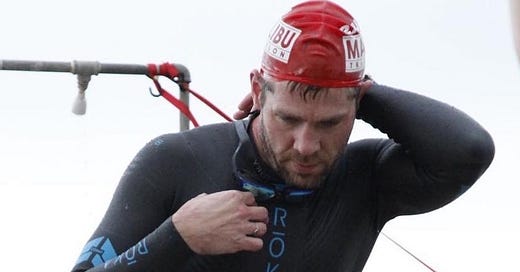18. Dreams
This is Western Coffee—notes on building the creative body. Last time: Preparation. The series is here. Please share this email; you can sign up free below.
The triathlon on Saturday turned out to be a chance to think about what separates good dreams—often thinly—from bad. Last year’s race, my first, was like a good dream: Sunny, gliding, prosperous, a little disjunct from reality. This year’s flirted with nightmare and settled, by the end, into a protracted stress dream: I’m meant to be running but my side is cramped so badly that I’ve got to walk—six miles, face to face on a tight loop with hundreds of my peers, to each of whom I wish I could say: I really did prepare.
There were two issues: The swim stage that opens the race changed from a straight line, parallel to the coast a hundred meters out, into a left-right-right-right contortion—supposedly so the spectators on the beach could walk a shorter distance as they monitored our battle with the deep.
The second problem was that stitch in my side, which made itself known moments after the transition from biking. Why would this happen, for only the third time in my year and a half as a runner? I guess it must be that I’d been hydrating all morning but also disorientedly swallowed a pint or so of seawater, a practice which if I remember right from history class has doomed more than one sailor.
What’s funny about dreams is that we have so little awareness from within them of whether they’re good or bad, and in fact the qualities of each commingle: A dream of discovery or resilience can sublease the terrain of a nightmare. Tragedy can infect a place where we’ve known only peace. It’s this ability of paradoxical feelings and sensations to be so adjacent to one another that makes a dream a dream.
When I was training for another big event in 2010, the AIDS/LifeCycle ride from San Francisco to Los Angeles, the handlebars broke off my two-year-old $1,600 road bike at an intersection near Griffith Park. Had this happened six or seven minutes earlier, during a 35-mile-per-hour descent of the arid switchbacks from Mount Hollywood, I’d be dead. When you have a bad accident, it’s only natural to think about how close you came to avoiding it; if only. But we rarely apply this logic in reverse, and of course each moment we’re alive is a moment we’ve been spared—broadly or narrowly, from the meteor or the car crash, the blood clot or the bomb. Life, so long as it goes on, is the counterfactual dream.
In those first few minutes in the water on Saturday I choked and gasped for air, panicked at the tightness of my wetsuit, and thought about waving to a lifeguard and getting myself out. That would be OK, I knew. The point was not the race but the life I’d assembled to get here, another year of discipline. I’d done everything I was supposed to; this was just the coda. And I couldn’t see another way through.
But then I remembered that sometimes the mantra I use in meditation—a word-sound with no English meaning—has been helpful to me in other contexts, and started reciting it in my head. I don’t exaggerate to say that within a couple of minutes my breathing had steadied and I’d rinsed the fog off my goggles and sighted the second buoy and started up a regular stroke.
I don’t know why this technique worked, but I do know that certain modes of meditation come close to dreaming, with the same gentle tumbling profusion of unaffiliated notions—now and then frightening and dislocating, but never in my own experience durably so. There might be value in knowing that this machinery of randomness is always at work in us—perhaps a better reflection of true existence than anything narrative. You could say the real definition of a bad dream lies in our desire to fight it off; of a good one in our ability to live by its terms. This is not to say, surrender to drowning. But the way from disaster can’t run through nightmare, or that is where it will stay. The great power of those who aren’t confined to dreams is to awaken—and to declare, with the right word, that the nightmare is ended.
Coming Friday: Symphonies.
Kindly send me your thoughts, questions, and provocations: dmichaelowen@gmail.com. And say hi on Instagram, or let’s Peloton together: @leggy_blond.



